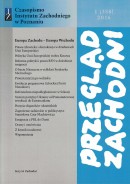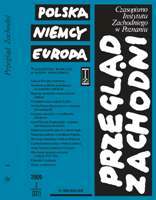
Book Reviews
Oceny i omówienia
Keywords: expulsion; Vertreibung; Polish Migration in UK after 1945; Czech historiography; the Third Reich; German in Czechoslovakia; Auschwitz; Fashism; History in the German literature after 1945; debate on German history;
Rafał Stobiecki, Klio na wygnaniu. Z dziejów polskiej historiografii na uchodźstwie w Wielkiej Brytanii po 1945 r. (omów. Sławomir Łukasiewicz) Jaroslav Pánek, Rozmluvy s historiky. Ceská historiografie a soudobé dejiny ocima zahranicních kolegu (omów. Marceli Kosman) Micha Brumlik, Wer Sturm sät. Die Vertreibung der Deutschen (omów. Piotr Madajczyk) Klaus Bachmann, Długi cień Trzeciej Rzeszy. Jak Niemcy zmieniali swój narodowy charakter (omów. Joanna Nitka) Karol Jonca, Dekrety prezydenta Edvarda Benesa. Niemcy w czechosłowackiej doktrynie politycznej i prawnej z lat 1920-1945 (omów. Władysław Chlebowski) Christoph Cornelißen, Roman Holec, Jirí Pesek, Diktatur - Krieg - Vertreibungen. Erinnerungskulturen in Tschechien, der Slowakei und Deutschland seit 1945 (omów. Aleksandra Kruk) Laurence Rees, Auschwitz. Naziści i "ostateczne rozwiązanie" (omów. Rafał Matera) Robert O. Paxton, Anatomia faszyzmu (omów. Michał Urbańczyk) Peter Englund, Listy ze strefy zerowej (omów. Waldemar Łazuga) Carsten Gansel, Paweł Zimniak (Hg.), Reden und Schweigen in der deutschsprachigen Literatur nach 1945. Fallstudien (omów. Roman Dziergwa) Peter Oliver Loew, Gdańsk literacki (1793-1945) (omów. Marek Andrzejewski)
More...

